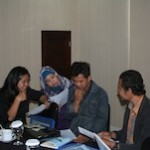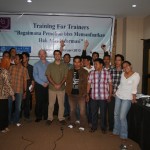 Weak civil society demand for information, combined with a lack of understanding about how to make requests for information, can be a major implementation weakness in countries seeking to implement new right to information (RTI) laws. To help address this problem in Indonesia, the Centre for Law and Democracy (CLD) and the Alliance of Independent Journalists (AJI) have just completed a training of trainers programme in Jakarta. Trainees from across Indonesia will follow up by conducting training programmes for civil society organisations in their home provinces of West Java, South Sumatra, West Nusa Tenggara and North Sulawesi. Those groups will then be expected to lodge a minimum of ten requests for information related to the areas in which they work, while the trainers will provide support to them through this process.
Weak civil society demand for information, combined with a lack of understanding about how to make requests for information, can be a major implementation weakness in countries seeking to implement new right to information (RTI) laws. To help address this problem in Indonesia, the Centre for Law and Democracy (CLD) and the Alliance of Independent Journalists (AJI) have just completed a training of trainers programme in Jakarta. Trainees from across Indonesia will follow up by conducting training programmes for civil society organisations in their home provinces of West Java, South Sumatra, West Nusa Tenggara and North Sulawesi. Those groups will then be expected to lodge a minimum of ten requests for information related to the areas in which they work, while the trainers will provide support to them through this process.
 “Experience in many countries shows that weak demand for information is one of the key factors undermining successful implementation of RTI regimes,” said Toby Mendel, Executive Director of CLD. “We are seeking to build a core of groups in different parts of the country that have experience in making requests, which we hope will demonstrate the potential benefits of RTI for other groups working in their sectors.”
“Experience in many countries shows that weak demand for information is one of the key factors undermining successful implementation of RTI regimes,” said Toby Mendel, Executive Director of CLD. “We are seeking to build a core of groups in different parts of the country that have experience in making requests, which we hope will demonstrate the potential benefits of RTI for other groups working in their sectors.”
“Although it has been in effect since 1 May 2010, implementation of the RTI Law is still very weak”, said Eko Maryadi, President of AJI. “Public bodies have not taken the necessary steps to implement the law and they are still trapped in culture of secrecy.”
The training program is part of a broader programme sponsored by Open Society Foundations aimed at boosting the right to information in Indonesia. The programme also includes supply-side interventions, grassroots activities and the production of resource materials.
More information on the programme, as well as versions of the training manual in both English and Bahasa Indonesia and other resources, are available at: http://www.law-democracy.org/live/projects/rti-in-indonesia/.



